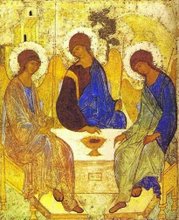Tuesday, March 18, 2008
The Church is mourning
Now, you may have heard that today was her funearal. EWTN was supposed to brodcast her funeral Mass. I don't know if I missed it, or if it is yet to come. But you can still watch it here.
I knew the focolared movement when I was in Africa at about the same time I joined schoenstatt. I didn't join it but it was great to be with focolare people.
My condoleances to all focolare and focolarini. She was a great Mother to all of us.
The Church is also mourning the archibishop of Irac who was kidnaped and was found recently dead.
May eternal light shine upon them.
Friday, March 14, 2008
"My food is to do the will of the one who sent me and to finish his work” (Jn 4:34)
"My food is to do the will of the one who sent me and to finish his work” (Jn 4:34)
march 2008
These wonderful words of Jesus can be repeated, in a sense, by every Christian and, if put into practice, they are capable of leading him or her far ahead in the Holy Journey of life.
Jesus, seated at Jacob’s well in Samaria, was concluding his conversation with the Samaritan woman. The disciples, having returned from the near-by city where they had gone for supplies, were surprised to find the Master speaking with a woman, but none of them asked him why. When the Samaritan woman left, they urged him to eat. Jesus intuited their thoughts and explained the reason behind his actions: "I have food to eat of which you do not know."
The disciples didn’t understand: they were thinking of material food and they asked one another if someone had brought food to the Master during their absence. So then Jesus said openly:
"My food is to do the will of the one who sent me and to finish his work.”
We need food every day to keep us alive. Jesus does not deny this. In fact, he is speaking here of food, something natural and necessary, but he does so in order to affirm the existence and need for another kind of food, a food that is more important and that he cannot do without.
Jesus came down from heaven in order “to do the will of the one who sent [him] and to finish his work.” He did not have thoughts or an agenda of his own, but only those of his Father. The words he spoke and works he did were those of the Father; he didn’t do his own will but that “of the one who sent” him. This was the life of Jesus. Doing this satisfied his hunger; doing this nourished him.
Complete adherence to the Father’s will was characteristic of his whole life, right up to his death on the cross, where he truly finished the work that the Father had entrusted to him.
"My food is to do the will of the one who sent me and to finish his work.”
Jesus considered doing the will of the Father as his food, because by carrying it out, “assimilating it,” “eating it,” identifying with it, he received Life.
And what was the will of the Father, his work, that Jesus had to finish?
It was to give salvation to all people, to give them the Life that does not die.
Shortly before, Jesus had communicated a seed of this Life to the Samaritan woman through his conversation with her and through his love. In fact, the disciples soon saw this Life spring forth and go out to others because the richness the Samaritan woman had discovered and received she communicated to other Samaritans: “Come see a man who told me everything I have done. Could he possibly be the Messiah?" (Jn 4:29).
In speaking to the Samaritan woman, Jesus revealed the plan of God who is Father: that all people receive the gift of his life. This is the work that Jesus urgently wanted to finish, in order to entrust it then to his disciples, to the Church.
"My food is to do the will of the one who sent me and to finish his work.”
Can we also live this sentence of the Gospel which is so typical of Jesus that it reflects his being, his mission, his zeal in an altogether special way?
Certainly! We also will have to live out our being sons and daughters of the Father through the Life that Christ shared with us, and in this way nourish our lives by doing his will.
We can do so by carrying out moment by moment what he wants from us, accomplishing it in a perfect way, as if we had nothing else to do. In fact, God wants nothing else.
Let us feed on what God wants from us moment after moment and we will experience that it satisfies us: it gives us peace, joy, happiness, it gives us—it’s no exaggeration to say—a foretaste of heaven.
In this way, even we can cooperate with Jesus, day by day, in finishing the work of the Father.
It will be the best way to live Easter.


